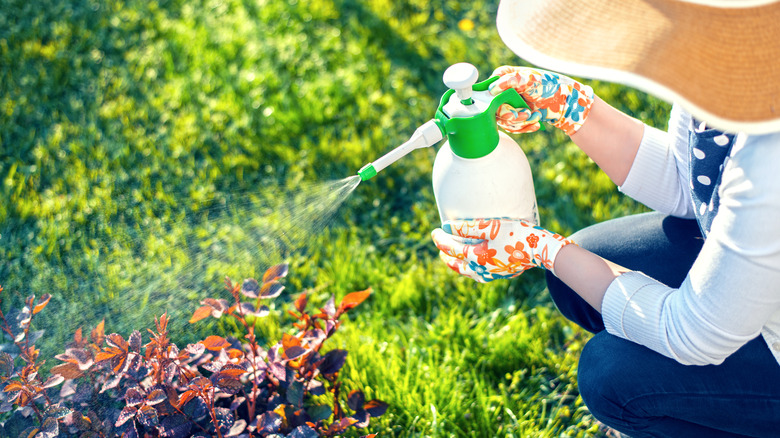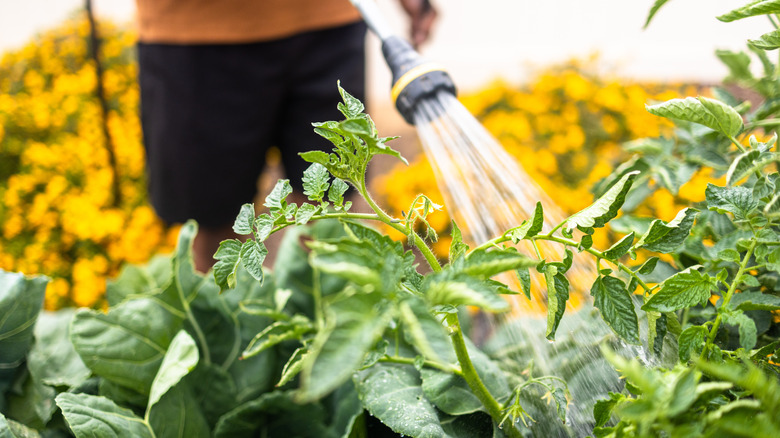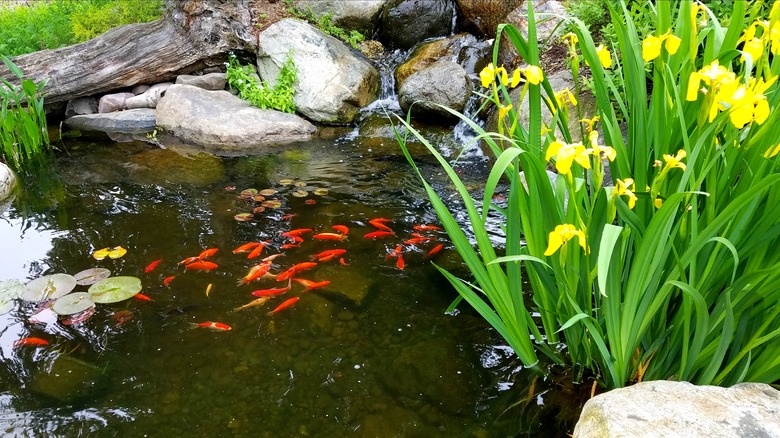The Hidden Benefits Of Wood Vinegar & Why You Should Start Using It In The Garden
You've heard of white vinegar and probably even apple cider vinegar, but did you know that there's also wood vinegar? This one won't be a great addition to your salads, though. Wood vinegar is a naturally-derived liquid that's a byproduct of the destructive distillation of wood or other plant materials. While wood vinegar is mostly water, it does contain nearly 200 other organic compounds, some of which include acetic acid, acetone, and methanol. The process of making wood vinegar is slightly involved and isn't something you'd DIY, as it requires an elaborate setup and can be quite dangerous; however, in essence, to make wood vinegar, wood is heated in an airtight container without any oxygen, causing it to break down and release volatile compounds. These vapors are then condensed into a liquid form, resulting in wood vinegar.
Wood vinegar has several beneficial properties when applied to your garden, helping to improve the vitality of your plants. First and foremost, it acts well as a natural pesticide, replacing the need to use harmful chemicals that may work their way into your meals if you were to apply them to your edible crops. Moreover, you can also use it to improve the health of the soil in your garden, as it can promote microbial activity. At the same time, it can also help your plants develop stronger roots, which enhances their nutrient uptake and ultimately produces stronger crop yields. It's believed to improve the flavor of your edible plants, too.
How to use wood vinegar in the garden
If the benefits of wood vinegar sound enticing, then you'll love to know how to apply it to the plants in your garden to help promote healthier growth. One common method is to use it as a foliar spray. In order to do so, you'll have to dilute the wood vinegar with water according to the manufacturer's instructions indicated on the bottle. Oxford Biochar recommends diluting 1 part wood vinegar to 200 parts water and spraying the mature leaves of your plants monthly with the solution. After the first application, you can also increase the solution dilution to 1:300, vinegar to water. Applying wood vinegar as a foliar spray can help deter pests like aphids and mites as well as fungal diseases like powdery mildew and leaf spot.
For a soil application, you can dilute the vinegar to use as a drench or incorporate it into your compost or gardening mulch. For a soil drench, mix the wood vinegar with water at a ratio of around 1:200, vinegar to water, and then apply it directly to the soil around the base of your plants. This method will help to improve your garden's soil structure, enhancing nutrient availability to plants. Incorporating wood vinegar into compost or mulch can also enrich the soil with beneficial organic compounds, contributing to overall soil health and fertility. Dilute the vinegar to water at 1:100 parts before adding it to your compost or mulch.
Cautions for using wood vinegar
Though wood vinegar offers a variety of benefits to the plants in your garden, it's important to know how to use the solution properly in order to protect your plants. Since the organic compounds that compose wood vinegar are so acidic, using an undiluted or incorrectly diluted solution can actually harm your plants. High concentrations of this liquid may cause leaf burn or damage to other plant tissues. This is particularly a concern for young or sensitive plants. Be sure to follow the dilution guidelines on your bottle and defer to them over other sources for proper and safe use. You can also spot-test the solution on a small area before proceeding to cover an entire plant with foliar spray.
Another caution to keep in mind is that wood vinegar can leach from the soil into nearby environments. If you are using this substance on plants that are near any sources of water or waterways, it's best to use wood vinegar with restraint. At times, it has been seen to have toxicity for fish, so if your land abuts any lakes, ponds, rivers, or even personal koi ponds, the wood vinegar could impact the health of these organisms. That being said, research indicates that even with this slight risk, wood vinegar is still a preferred alternative to chemical pesticides or fertilizers that may have an even larger and more detrimental impact on the environment. Nevertheless, proceed with caution when using any soil amendment.


